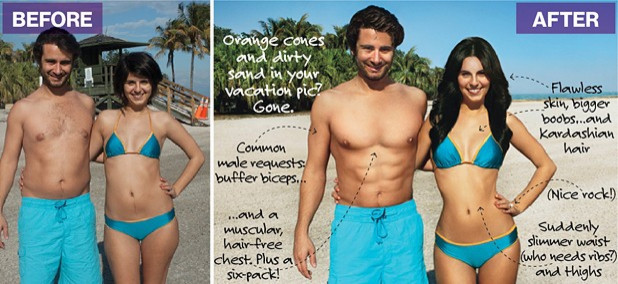Retouching Photos: When to Stop Chasing Perfection?

How many of us would agree that we are all tempted and maybe we almost always do a little bit of retouching to our pictures before we upload them on networking sites for our friends to see? Well, it's no secret, but almost all of us have done it.
For most of us, it is probably a compulsive need to look better online. It is your picture after all, and you can decide how you want people perceive your looks. It is certainly not harming anyone, and all it does is to get you more number of Likes on Facebook, and also gets you comments from your friends which boost your self-confidence!
Perhaps, because of this reason, Giles Fabris, who is not a doctor, but is the CEO of a Web site called lookbetteronline.com, gets more body-altering requests than some plastic surgeons. People contact him all the time, wanting to shed a few pounds from their frame, or people wanting to add a little more hair to their bald head.
lookbetteronline.com is a photo and retouching service that thousands of people have hired, usually to get the best possible image of themselves to post on dating Web sites. Well, so how much is too much?
According to Fabris, using a retouch to remove your blemishes, working on your complexion, is still ok. But what is not, is perhaps making drastic changes and trying to look perfect.
The right photo, he says, makes a huge difference in how people perceive you on the Web.
Fabris's business is sure booming with more and more people chasing their perfect self in pictures. One just has to Google personal photo retouching to get at least 2,350,000 results for professional services like his, along with do-it-yourself software.
YouTube is also of great help, offering tutorials along with numerous iPhone to be there for help.
We all want to look perfect, undoubtedly. But when given a second thought, what is perfect after all? Who defines perfection? Why are we not considered perfect when we are our real self and why do we chase perfection? Elements of retouching have existed openly in advertisements, movies, catalogs and magazines.
Hany Farid, Ph.D., a professor of computer science and digital forensics at Dartmouth College, who has studied retouching, says that till a few years ago, altering pictures was not an easy job like today and now people can do it on their personal computers and cell phones.
But the whole idea of altering images is certainly harming someone somewhere. There a lot of innocent teenagers who, in an attempt to look better, do not even think twice before going under the knife. They believe the images to be real.
Major health organizations, like the American Medical Association, are calling for advertisers to tone down their tweaking because of the negative impact it's been proven to have on body image. And the political world is taking notice too, says Farid.
To find out what is ok for people and companies/magazines to do with the pictures, Glamour Magazine commissioned an independent nationwide survey of 1,000 women.
According to the magazine, the most surprising finding of the survey was when respondents were asked how accepting they were of retouching in their everyday lives, almost 60% of them approved of it.
I want to present the best version of me, Shannon Hiett, 29, of Doylestown, Pennsylvania, was quoted as saying by the magazine.
The magazine said that many women also said they feel compelled to fix imperfections.
When the magazine tried to find out as to what kind of changes women make, it was revealed that of those who have retouched photos, 65 percent remove skin imperfections, 36 percent fix stray hairs and 34 percent whiten teeth.
Farid, however, says that he has observed more dramatic changes than that: On women I most often see wrinkles erased, skin smoothed, body fat trimmed and boobs made bigger or more gravity-defying, he says.
For men it is under eye bags, bigger biceps, a more muscular chest and taking off weight so they look leaner. It's like the women move toward Barbie, and the guys move toward G.I. Joe, the magazine said.
There are certainly problems with extreme alterations. I want to look like me on my best day, not change my body, says Janet Rodriguez, 23, of Norwalk, California. That feels deceitful.
Many a people have also experienced such kind of deceit on dating sites. People alter their images to the extent that in reality, they can be hardly recognized when compared to their photographs.
A 44-year-old male entrepreneur from San Diego tells a similar story and adds that it is not the shockingly different looks. Just that who wants to start a relationship on a lie?
In the survey, only 43 percent of women said it was ok for magazines to retouch, and just 39 percent were comfortable with ads doing so.
Fabris advises women to love and be their beautiful and original self and to go easy with the retouching software: Photoshop is like the Force. There's a light side and a dark side. Wield the retouching tool wisely and with restraint. Don't represent yourself as any different than who you really are-or at least who you are with great lighting, good makeup and a lot of sleep.
© Copyright IBTimes 2024. All rights reserved.





















